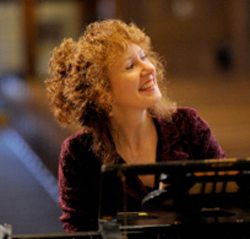by Mike Telin
“It
On Saturday, February 9 at 8:00 pm in Akron’s E.J. Thomas Performing Arts Hall, Sorrell will make her third appearance as guest conductor of the Akron Symphony in a program featuring Bach’s Brandenburg Concertos Nos. 1 and 5 and selections from Handel’s Water Music Suites. Sorrell’s previous ASO appearances have featured an all-Mozart program as well a concert of music by Mozart, Beethoven, and Schubert. “This is the first time I will be conducting baroque repertoire with the Akron Symphony. It will be fun and we are all excited about the program.”
Why is it that baroque music is reappearing on the programs of modern orchestras? Sorrell sites the popularity of baroque groups and festivals across North American as well as CD sales. “Many baroque groups are doing very well in terms of audience attendance and I think modern orchestras are noticing.” Indeed they are and many, like the Akron Symphony, are engaging conductors who are baroque specialists to work with their ensembles.
Recently, conductors Nicholas McGegan, Bernard LaBadie and Ton Koopman have made appearances with the Cleveland Orchestra. And indeed audiences cannot get enough of the genre. Recently, Cleveland’s Baroque Orchestra, Apollo’s Fire, which Sorrell founded in 1992, sold out eight local performances as well as a run out concert of their holiday programs. “It was the first time we did two different holiday programs and we were afraid the audience might be divided, but that did not happen, so we were excited.”
Are there any challenges involved in performing this music in a large hall with a modern orchestra? “The Thomas Hall is big, but we have chosen festive pieces that can produce a big sound,” Sorrell says. “I have added some additional markings in the orchestra parts. I have worked with a number of modern orchestras before and I find that in general they tend to work with less rehearsal time then baroque groups, so it is important to mark a little more detail in the parts so everyone will understand what the [musical] goals are.”
Although the 1st Brandenburg Concerto has received a few recent performances locally, concertgoers may not be as familiar with it as they are with some of its more popular siblings. The 5th Brandenburg Concerto will feature violinist and Apollo’s Fire concertmaster Olivier Brault, Akron Symphony principal flutist Barbara O’Brien and Sorrell on harpsichord. Brault, himself a baroque violin specialist, will have a couple of decisions to make before Saturday’s performance. Sorrell chuckles when asked about baroque versus modern pitch and will Brault use a baroque or modern instrument? “We will certainly be playing at modern pitch, but at this point he has not decided whether he will perform on a baroque or modern instrument. Although I think he would like to try using his baroque violin in rehearsal.”
The 5th Brandenburg Concerto also contains a notoriously difficult harpsichord cadenza. “It was starting to feel easy for the first time ever this year,” Sorrell says. “We did four performances with Apollo’s Fire in the Cleveland area in the fall and then took it on tour. I found that during the fourth or fifth performances it was starting to feel easy, which was a really fun feeling to have, I must say. I’m playing the piece quite a lot this year. In addition to the Apollo’s Fire performances and the Hilton Head Symphony, in April I will be conducting all six of the Brandenburgs with the Pittsburgh Symphony.”
Rounding out the concert are selections from Handle’s three Water Music Suites. “Handel really knew what he was doing. He was a master at getting a baroque orchestra to sound big and loud and festive,” Sorrell says. “And of course with the Water Music he was trying to write in a way so that the orchestra would sound bold and festive out of doors. He did that by using a lot of horns, trumpets and double reeds and he created something that you could hear on the River Thames. I’m sure that the King and the Royal party who were out boating could easily hear it.”
With even more conducting engagements with modern orchestras coming her way in the future, Sorrell laughs when asked if we can expect to have her debut with Mahler anytime soon. “Absolutely not! There are plenty of other people who do that really well and I’m happy to leave it to them.”
Published on ClevelandClassical.com February 5, 2013
Click here for a printable version of this article.



